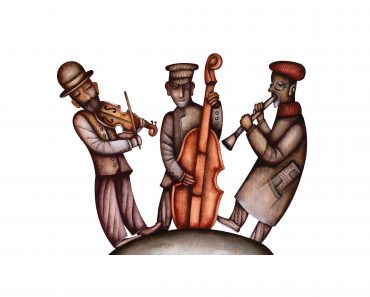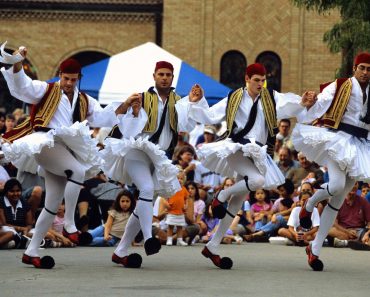
After a hiatus of several years, Michalis Ganas had turned to prose more recently, as he felt he had exhausted the themes driving his poetry. [Nikos Kokkalias]
The news of Michalis Ganas’ death at age of 80 after a serious illness filled his loved ones and friends, his colleagues and all those who knew him personally or through his verses with sorrow. For although he had a reserved air, much like the songs of his homeland, he was a forthcoming, sincere and down-to-earth man.
He was born in 1944 in the mountains of Epirus, in the village of Tsamantas in Thesprotia, later moving to Athens to study law at a relatively young age. It was a separation with his roots that went on to feature prominently in his work. He gave up on a career in law in 1962, settled in the capital for good and set out to make a living. He worked in publishing for 15 years, where he also met his wife, Poppy Gana, and then worked as an editor of literary shows and scriptwriter at state broadcaster ERT. He joined an advertising agency as a writer in 1989 and also made a name for himself as a songwriter, revitalizing songs with richly emotive yet profound lyrics.
Above all else, however, Michalis Ganas was a poet who wrote “clear and simple verse, in an unadorned language, filled with emotion,” according to Stavros Zouboulakis, author and president of the Board of Trustees at the National Library of Greece, on the occasion of the Golden Cross of the Order of Honor awarded to the poet in 2022 for his life’s work by the Kostas and Eleni Ouranis Foundation, under the auspices of the Academy of Athens.
‘Poetry was a blessing, on the one hand, but it was also a great torment, on the other, because it constantly knocked me out of the ring’
“Lyrical, impactful and succinct, drawing manners and rhythms from folk songs and dialects, Michalis Ganas is a poet who evokes deep emotion without a trace of melodrama. Through his poems and short prose, he built a solid bridge between the bygone rural world and modern life, leaving an indelible mark on our collective sensibility,” Greek President Katerina Sakellaropoulou noted when she bestowed the award.
His work is so widely valued in Greece that “Ioannina, City of Glass,” the first poem in the collection of the same title, is part of the Modern Greek curriculum at the country’s schools. This resonance, perhaps, stems from the fact that his poems convey scenes and experiences from the land of his birth, that his verses have the simplicity of the spoken word or that his opus is a legacy of the country’s demotic traditions.
Poems by Ganas have been translated into Albanian, French, German and Italian, and have also featured in anthologies across numerous languages – English, Bulgarian, Chinese, Czech, Finnish, French, Georgian, German, Hungarian, Italian, Polish, Romanian and Spanish.
His verses have also been set to music by great Greek composers like Mikis Theodorakis, Nikos Xydakis, Dimitris Papadimitriou and Nikos Kypourgos, but also by foreign composers such as Goran Bregovich.
His awards and accolades include the State Poetry Prize in 1994 and the Academy of Athens’ Petros Charis Foundation’s Poetry Prize for his entire body of work in 2011.
After a hiatus of several years, he had turned to prose more recently, as he felt he had exhausted the themes driving his poetry. Striving for the same immediacy, he worked diligently at prose, as this was always his relationship with writing: a struggle with vastness, which he could never quite contain.
“Poetry was a blessing, on the one hand, but it was also a great torment, on the other, because it constantly knocked me out of the ring. I never did join these circles. Generally, I never was one for the collective… I’m a loner, you see. Loners are what they call wild animals that live alone,” Ganas said in an interview with Kathimerini in 2008.








